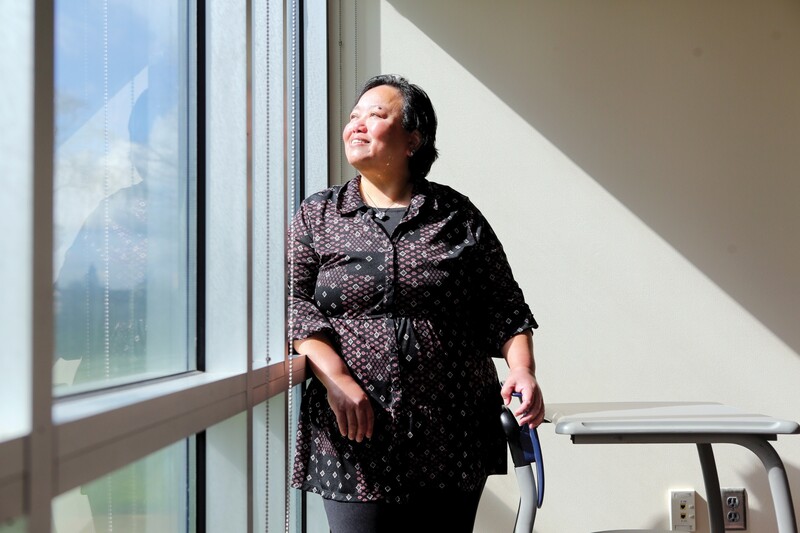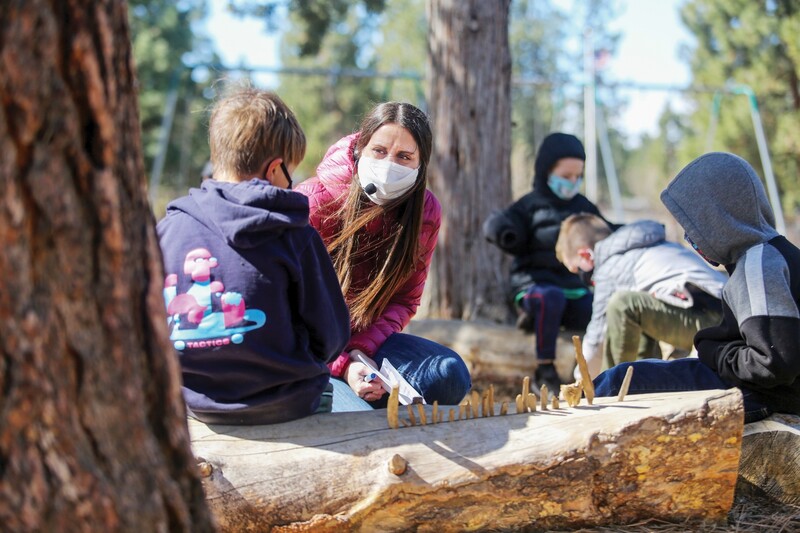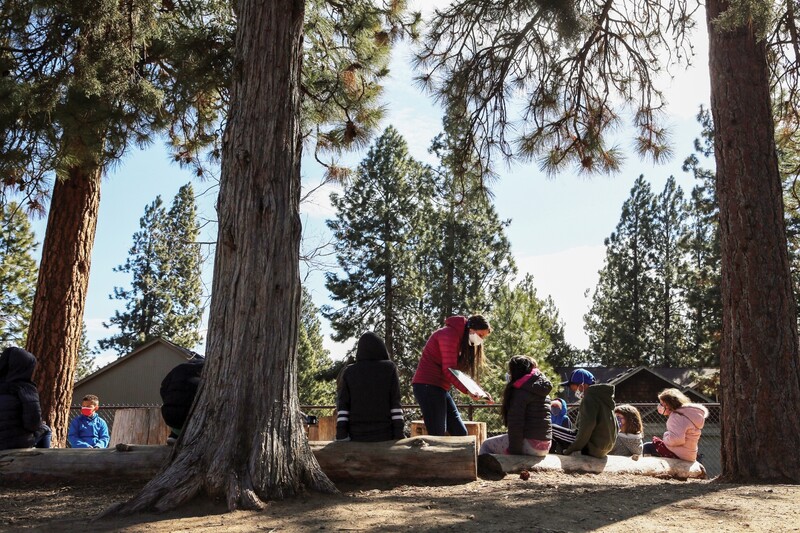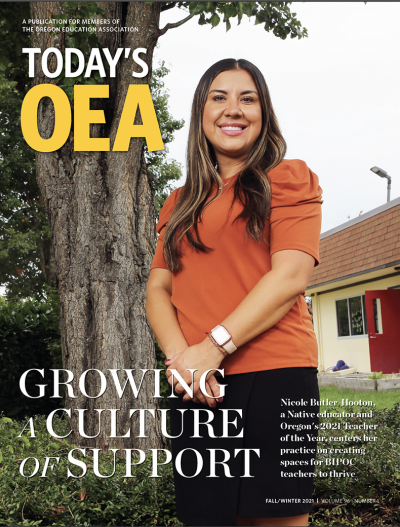Puilan Cheng
High School Math Teacher, Woodburn
2021 NBCT BIPOC Cohort Grantee
There’s something special about the students who sit in the back of the room. At least for Puilan Cheng, those students remind her of her own story.
When she immigrated to the US as a high-schooler from China, Cheng dreaded the idea of being called on. The language barrier felt overwhelming — she would try to hide in the back of the room, hoping her teacher would look past her.
Now, as a teacher in Woodburn, where many of her students are from predominantly Spanish or Russian-speaking homes, Cheng connects to their experiences. Though they come from different language and cultural backgrounds, she understands what it’s like to be a student in a system that hasn’t always been designed with ESOL students (English for Speakers of Other Languages) in mind.
Cheng is setting out on a journey to change that.
“I can relate to their stories. I didn’t want to be asked a question because I might feel embarrassed. I was that person. But as a teacher, I believe learning should come with joy. It should not be painful,” she says.
Through a new opportunity grant she’s received from OEA geared specifically to BIPOC and Early Career educators, Cheng is in her first year of pursuing the National Board Certified Teacher (NBCT) program — a national endeavor to develop, retain and recognize accomplished teaching through a practice-heavy certification process. She’s been interested in the program for years, having first heard about it when she was a teacher in Florida about ten years ago. The cost of the program was prohibitive – around $5,000 at the time, self-funded. (The cost in Oregon is now $1,900 for the four components, plus a $75 registration fee). Now, five years into her teaching career in Woodburn, Cheng was able to apply for a BIPOC grant to have the cost of the NBCT program paid for by her union.

“I said to myself, ‘Puilan, you have no excuses. You have to take the opportunity and go through the process.’ That’s one of my driving forces - because I received the grant. In terms of the inspiration, it’s mainly my curiosity about the National Board process and that journey. And also… how can I [use it to] improve my teaching skills and increase student learning, and meet their needs?”
For Cheng, serving her students in culturally appropriate ways seems to be the ultimate motivator. She’s currently pursuing Component One of the 4-part NBCT program, which focuses on her knowledge and content of her subject area (math). She studies calculus, geometry, algebra and linear math in the evenings at home. “I’ve always been good with numbers. My husband will ask me, ‘do you really want to do math at home in the evening?’ And the answer is yes. And then he’ll say, ‘there’s something wrong with you…’” Cheng erupts into laughter, before offering a sound piece of teaching advice: “If you’re really passionate about something, then it’s not work. And I’m really passionate about math, so it’s not really work for me.”
She next plans to tackle Component Four — assessment. “I’m really looking at what I want my students to learn and [how I] meet their needs and provide the opportunity for them to grow and learn. I look at things like: did I differentiate my instruction properly so that I can help my struggling student, my IEP student, and my ESOL student? Now, every time I create an assessment, I can look at it like a checklist. Did I cover every student, or do I have an alternative way for them to share with me what they learn or what I can assist them with?” Cheng says every educator, whether or not they pursue National Board Certification, would benefit from the principles embedded in this component.
For Cheng, the motivation to pursue National Board Certification stems from a deep desire to serve her students in the most effective way possible. “That’s one of those things that gets me thinking as I’m going through this process. Yes… I know I am a good teacher. But am I an effective teacher?” she says.

She uses the example of her language background as a learning tool. “I do have a heavy accent, and I know my instruction needs to be written down or made into a poster. I need to give extra time and repeat myself frequently. Those are the things that I know [are] very essential for my students, and also how I, myself, learn,” Cheng says.
“I see how I learned English, when I was in high school and first came to this country and didn’t know any of the alphabet. How did I learn? That’s pretty much how I reflected about how my students will need me to help them. I do see the connection between me being a BIPOC teacher and connecting to my students who aren’t native speakers of English.”
“That’s one of those things that gets me thinking as I’m going through this process. Yes… I know I am a good teacher. But am I an effective
teacher?”
— Puilan Cheng
Herein lies one of the principal goals of the new BIPOC and Early Career Educator cohort, says Michele Oakes, the state lead for Oregon’s NBCT program. “Our goal is to increase the number of National Board Certified Teachers of Color, as well as the number of early career educators who are in their first five years. We’re really trying to think about equity in our accomplished teaching in schools. How are we really supporting all of our kids, and supporting our teachers?” Oakes questions.
In 2017, HB 2763 funneled additional money — around $1.74 million — into Oregon’s NBCT program, reimbursing educators for a portion of the cost of the certification process. And yet, Oregon’s NBCT rate has lagged well behind neighboring states (there are around 300 current National Board Certified Teachers in Oregon, compared to over 1,000 in Washington, as an example).
“The student data out of Washington really reflects the impact that accomplished teaching has on education – so, Oregon is really trying to think about how we can do that with our educators, but especially our BIPOC and Early Career [educators], who have the most barriers. How can we alleviate some of those barriers – financial, time, and support?” Oakes says. “This grant is hopefully one way to do that.”
Dannika White
First Grade Teacher, Bend-LaPine
2021 NBCT Early Career Educator Cohort Grantee
Oregon has several districts that have fully embraced the NBCT process — offering stipends or bumps on the salary schedule to those who pursue certification. The Bend-LaPine School District has been especially supportive of teachers who are becoming Board certified. At Pine Ridge Elementary in Bend, a team of teachers is going through NBCT together as part of OEA’s Early Career Educator grant opportunity.
Dannika White is one of three educators in her building who are part of that cohort. The educators returned to their building for hybrid teaching about three months ago, and journeying through the NBCT process together and in-person has been rewarding, especially after the feeling of disconnect over the last year, White says. “We try to meet with each other once a week and check in and set goals – ‘let’s work on this until we meet next time…’ — having that accountability has been so important,” she says.
White is newer to teaching with her own classroom, but not necessarily new to teaching — she worked as a substitute teacher for nine years while her two kids were very young. She adores teaching first grade now and says the community at Pine Ridge is tight-knit, with parents who want to see their students do well.

Dannika White, an Early Career Educator at Pine Ridge Elementary in Bend, teaches her students in their outdoor classroom as a COVID-19 precautionary measure. The new environment has inspired additional opportunities for engaging her students in their hands-on learning.
As she’s begun the National Board process, she’s been able to become more reflective about her practice with every student, and how it is differentiated between one student and the next. She is currently pursuing Component Two in the certification process, which is all about differentiation. She points to the experience of one of her ESOL students, who spent a year at home due to COVID-19 speaking little to no English. When he arrived back in the classroom, he lagged far behind his peers in writing. She conferred with his ELL teacher, and they developed a system to support him. He’d tell a story, and White would write where the words would go in the sequence; he’d say one sentence at a time and would be asked to physically touch where to place certain words. There was deep scaffolding going on to support him, but he made steady progress.
At the same time, White was also able to differentiate her instruction for students who were ready to expand on simple writing — building out supporting ideas, opinions, and conclusions as they moved into second-grade level writing skills.

While we often talk about burnout among newer teachers, there’s also an unspoken truth that shapes Early Career Educators’ willingness to pursue certification. “I think our beginning teachers are very hungry for the professional learning and want to think about what they need and what their students need,” says Oakes. She’s been inspired by the response of newer educators who are part of the grant opportunity and says the community of support (even in a Zoom environment) is palpable.
White’s experience reflects this reality — she’s been participating in Bend-LaPine’s PASS program (Professional Advancement and Support Systems) — and the journey into NBCT has been a natural progression. “The PASS Program already had me reflecting on my practice a ton. My drive home is always me asking myself, ‘what did I do today that I liked? What would I change?’ And now, with National Board, I’m working on putting those thoughts down on paper and reflecting on my own growth, just like my students are.”
Learn more
National Board is a voluntary process in which educators analyze and reflect on their teaching practice while holding it against the National Board Professional Teaching Standards. Teachers spend 1-3 years working on their portfolio that provides evidence of their accomplished teaching. There are 25 certificate areas with varying developmental ranges which allows for most educators to pursue National Board certification as part of their professional learning journey. NBPTS is developed by teachers for teachers.
To learn more about NBPTS visit: boardcertified teachers.org.
To see upcoming NBCT information sessions offered through OEA, or learn more about the BIPOC and Early Career Educator grant opportunity, visit: oregoned.org/NBCT.

